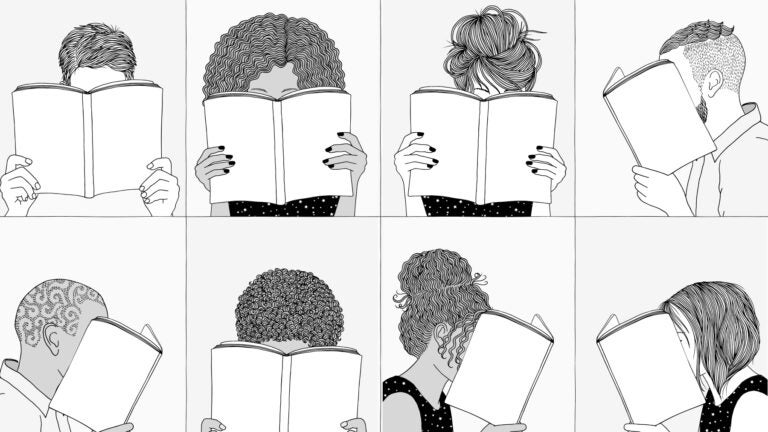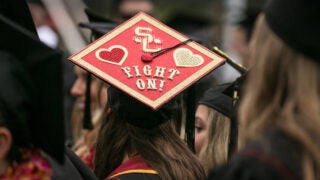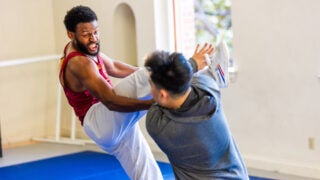
National Read a Book Day offers a chance for readers to expand their literary horizons. (Illustration/Letty Avila, iStock)
On National Read a Book Day, USC faculty give their top choices
Citing works of science fiction, nonfiction, biography, humor and horror, six professors offer their literary choices
Science shows that reading can improve memory, concentration and intelligence. It also fosters empathy and critical thinking, skills needed to understand and relate to characters and plots. It might even fight Alzheimer’s disease. Despite the benefits, nearly a quarter of the nation’s adults have not read a book in the past 12 months, according to Pew Research Center.
National Read a Book Day, which falls on Sept. 6, encourages everyone to grab a novel, anthology, text book, memoir or the like — paperback or hardback, it’s reader’s choice — and read to themselves or anyone who will listen. Donating to a library or other reading resource is also encouraged.
Faculty members from the USC Dornsife College of Letters, Arts and Sciences make their recommendations of books to peruse on this annual literary occasion.
FRANCIS BONAHON
Professor of mathematics
Recommendation: House of Leaves by Mark Z. Danielewski (Pantheon Books, 2000)
“The mathematician in me really liked the broken, self-referential narrative as well as the playful page layout. Even the plot, involving the absurd expansion of the space inside of a house, aroused my geometric fiber. But the book is not just for math or computer science nerds (or literary deconstructionists). It does read like a puzzle and, as such, will tickle your brain. However, its increasingly disturbing atmosphere will also progressively take over your heart.”
Bonahon has been a mathematics professor at USC Dornsife since 1986. He specializes in geometry and topology, with a particular fondness for mathematics involving pretty pictures.
LYNN DODD
Associate professor of the practice of religion
Recommendation: Sapiens: A Brief History of Humankind by Yuval Noah Harari (Harper, 2015)
“I ‘read’ Sapiens as an audio book, and it is a fascinating and accessible exploration of how we became what we are now: a human animal that leapt to the top of the evolutionary food chain in a blink of an eye. In fact, it’s controversial to think that the plants won, but that’s the sort of idea that you get from this book, along with the vision of blood on our collective hands: We descend from those who had a hand in the demise of all the other human species and megafauna on every continent. It gave me a lot to think about.”
Dodd is an archaeologist and specialist in heritage who has worked in the Middle East and also off the California coast around Santa Catalina Island. She runs the Archaeology Research Center and directs USC’s Archaeology Program.
JEFFREY FIELDS
Associate professor of the practice of international relations
Recommendation: The Continual Pilgrimage: American Writers in Paris, 1944-1960 by Christopher Sawyer-Laucanno (Grove Press, 1992)
“I read this book shortly after completing my undergraduate degree thinking I could be a writer (before I discovered I had neither the talent nor discipline). It has so much to offer aspiring writers and those who romanticize the literary life. The book presents a romantic view of Paris in the postwar period with up-and-coming American writers like Hemingway and Gertrude Stein interacting with each other and French intellectuals, hanging out in jazz clubs and drinking wine to the wee hours of the morning. It’s wonderfully researched and written. Each chapter focuses on specific writers so one can dive into the book at any place. The chapters that feature black authors like Chester Himes and Richard Wright are fascinating in their portrayal of these individuals finding much greater acceptance (and less racism) in France than America but still struggling with identity and their relationship with their home country. Several Beat poets make appearances, and a chapter on the founding of the Paris Review rounds out an excellent and fun read.”
Fields’ teaching and research focus on American foreign policy, international security, particularly the proliferation of weapons of mass destruction and theory in practice.
LANITA JACOBS
Associate professor of anthropology and American studies and ethnicity
Recommendation: The Last Black Unicorn by Tiffany Haddish (Gallery Books, 2017)
“Haddish’s book begins with a personal introduction from Tiffany herself. I call her by her first name (and you will, too) after this intimate and, at times, unbelievable read that will surely make you “laugh and cry.” Tiffany’s invitation is that we feel free to do both as she lays down tracks of her life in raw form. You’ll hear the comic in her searching for the funny, excavating it wherever she can and also letting some things that are not quite/yet/even funny sit there on the page with you. Somehow, even if you don’t share her experiences, you’ll dive deep into Tiffany’s lived experiences and emerge feeling ways about homelessness and food security, the under-spoken toll of sexual harassment faced by black comediennes, and the futile but dogged pursuit of intimacies with friends and family who do not have the capacity to love us back.
“Her story also recounts a kind of love that does not always make headlines: When she quietly slept in her car between comedy gigs, Kevin Hart loaned her money with no attachments for a hotel room. When Tiffany marshalled her dancing and DJ skills at bar mitzvahs, she “killed it” (in a good way), uniting folks in unforgettable ways. There are also bleaker moments of terrifying isolation, a barrage of “WTFs,” wherein Tiffany learned that laughter really and truly saves! You will want to read her book to bear witness to such triumphs. I did and ended up crying and laughing as I relived some of my own tragedies — this time, in the safety of Tiffany’s enduring testimony. We can all use a bit of that in our lives right now: a dose of ‘black girl magic’ that transcends age, time, difference and pain, uniting us all in our shared laughter and tears.”
Jacobs is a linguistic anthropologist. Her research broadly explores issues of language, gender and identity, race and representation, African-American humor, and race and disability.
VAHE PEROOMIAN
Associate professor (teaching) of physics and astronomy
Recommendation: Hyperion by Dan Simmons (Doubleday, 1989)
“This book is a very fun and interesting take on Chaucer’s Canterbury Tales, except that it takes place in the far future. Six chosen travelers begin a mysterious journey, which may end in their deaths, and each relates their story and their motivation for making the journey. Hyperion is really the first book of the Hyperion Cantos, a four-book series, but stands on its own. It won the prestigious Hugo Award for science fiction novels in 1990.”
Peroomian studies space weather and the impacts of solar storms on human technology.
HAJAR YAZDIHA
Assistant professor of sociology
Recommendation: The Limits of Whiteness: Iranian Americans and the Everyday Politics of Race by Neda Maghbouleh (Stanford University Press, 2017)
“For those of us who are of MENA (Middle Eastern/North African) descent, where we have long been considered white by law but experience recognition as anything but white in our day-to-day lives, Maghbouleh’s book sees us so clearly and writes our experience into being. Well-researched and beautifully written, I laughed and I cried as I read rich accounts of Iranian-American youth navigating racial ambiguity in different spaces, from home and school to summer camps and visits to the homeland. The Limits of Whiteness is a wonderful read for anyone interested in the contradictions and complexities of identity.”
Yazdiha studies the mechanisms underlying the politics of inclusion and exclusion, centering on the intersection of social movements, race and immigration.



